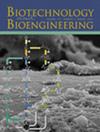Establishing a Serine Integrase-Based Genetic Memory System In Vitro
IF 3.5
2区 生物学
Q2 BIOTECHNOLOGY & APPLIED MICROBIOLOGY
引用次数: 0
Abstract
The increasing demand for advanced biosystems necessitates innovative approaches to store and process genetic information. DNA, as a high-density storage medium, offers a promising solution for creating genetic memory systems that can provide state-dependent responses to various stimuli. To date, numerous studies have reported on genetic memory systems in living organisms. However, developing modular, orthogonal, and quantifiable in vitro genetic memory systems with scalable biological components remains a significant challenge. In this study, we present an in vitro genetic memory system utilizing three orthogonal serine integrases for DNA-based information storage and processing. By organizing the system into three standardized modules featuring two noncovalent chemical interactions (streptavidin-biotin and parS-ParB), we successfully designed and tested the orthogonality, scalability, and functionalization of these systems. Notably, we expanded the application to implement a cascade biotransformation process converting styrene to (S)-1-phenyl-1,2-ethanediol ((S)-PED) with remarkable efficiency, achieving up to double the transformation rate compared to free-floating purified enzymes. We anticipate that these constructions hold significant potential for advancing artificial memory systems in vitro and will provide a reliable framework for the development of programmable biochemical functions in synthetic biology.

求助全文
约1分钟内获得全文
求助全文
来源期刊

Biotechnology and Bioengineering
工程技术-生物工程与应用微生物
CiteScore
7.90
自引率
5.30%
发文量
280
审稿时长
2.1 months
期刊介绍:
Biotechnology & Bioengineering publishes Perspectives, Articles, Reviews, Mini-Reviews, and Communications to the Editor that embrace all aspects of biotechnology. These include:
-Enzyme systems and their applications, including enzyme reactors, purification, and applied aspects of protein engineering
-Animal-cell biotechnology, including media development
-Applied aspects of cellular physiology, metabolism, and energetics
-Biocatalysis and applied enzymology, including enzyme reactors, protein engineering, and nanobiotechnology
-Biothermodynamics
-Biofuels, including biomass and renewable resource engineering
-Biomaterials, including delivery systems and materials for tissue engineering
-Bioprocess engineering, including kinetics and modeling of biological systems, transport phenomena in bioreactors, bioreactor design, monitoring, and control
-Biosensors and instrumentation
-Computational and systems biology, including bioinformatics and genomic/proteomic studies
-Environmental biotechnology, including biofilms, algal systems, and bioremediation
-Metabolic and cellular engineering
-Plant-cell biotechnology
-Spectroscopic and other analytical techniques for biotechnological applications
-Synthetic biology
-Tissue engineering, stem-cell bioengineering, regenerative medicine, gene therapy and delivery systems
The editors will consider papers for publication based on novelty, their immediate or future impact on biotechnological processes, and their contribution to the advancement of biochemical engineering science. Submission of papers dealing with routine aspects of bioprocessing, description of established equipment, and routine applications of established methodologies (e.g., control strategies, modeling, experimental methods) is discouraged. Theoretical papers will be judged based on the novelty of the approach and their potential impact, or on their novel capability to predict and elucidate experimental observations.
 求助内容:
求助内容: 应助结果提醒方式:
应助结果提醒方式:


